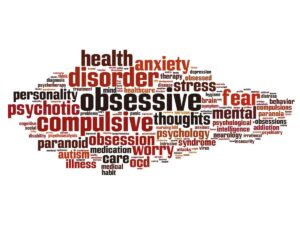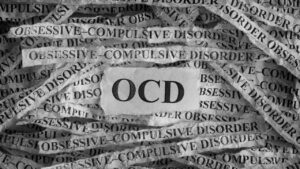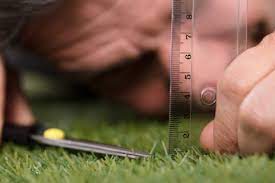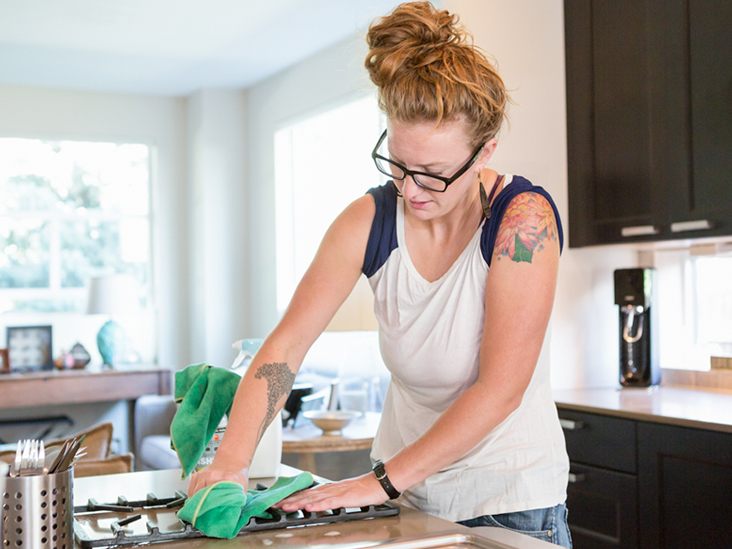Do you know what OCD is? Many people think that OCD is just a disorder that causes people to have obsessive thoughts about cleanliness or germs. While this is one type of OCD, there are actually many different types of OCD. In this blog post, we will discuss the most common types of OCD. If you think you may have OCD, it is important to understand which type of OCD you are dealing with so that you can get the right treatment.
Contents
What Is OCD?
 OCD means obsessive-compulsive disorder, it refers to a condition where a person experiences anxiety-inducing thoughts (obsessions), which they then attempt to relieve by engaging in repetitive behaviors or mental acts (compulsions). This situation is believed to be caused by a chemical imbalance in the brain, specifically with neurotransmitters like serotonin.
OCD means obsessive-compulsive disorder, it refers to a condition where a person experiences anxiety-inducing thoughts (obsessions), which they then attempt to relieve by engaging in repetitive behaviors or mental acts (compulsions). This situation is believed to be caused by a chemical imbalance in the brain, specifically with neurotransmitters like serotonin.
According to studies, OCD is one of the most common mental disorders, affecting around two percent of the world’s population. The condition is usually diagnosed in childhood or adolescence, but can also develop in adulthood. In fact, people believe that OCD is a lifelong condition that can never be cured.
Somehow, this is true because OCD is characterized by persistent and intrusive thoughts or images (obsessions) that lead to repetitive behaviors or mental acts (compulsions). The compulsions are done in an attempt to control or neutralize the obsessions. However, these compulsions only provide temporary relief and will eventually lead to more anxiety.
OCD can be a very debilitating condition, preventing sufferers from leading a normal and productive life. If you think you or someone you know may be suffering from OCD, it’s important to seek professional help. Some of the common signs and symptoms of OCD include:
- Excessive hand-washing or showering
- Checking things repeatedly
- Arranging and rearranging objects
- Hoarding objects
- Obsessive thoughts about germs or contamination
- Fear of losing control or harming oneself or others
- Unwanted sexually explicit or violent thoughts
Therefore, you need to be aware of the different types of OCD so you can better understand the condition. Let’s further discuss some of the most common types of OCD.
What Are The Types Of OCD?
 When you understand the basic term, it is easier to understand the different types of OCD. Let’s discuss some of the most common types of OCD that are listed below:
When you understand the basic term, it is easier to understand the different types of OCD. Let’s discuss some of the most common types of OCD that are listed below:
- Checking
- Contamination
- Scrupulosity
- Hoarding
- Perfectionism
Let’s explore each of these different types in more detail.
Checking OCD
This is one of the more commonly known types of OCD. Checking OCD is when a person has an uncontrollable urge to check things. This could be checking the locks on doors, the stove, or even checking to see if their loved ones are safe. People with Checking OCD often feel like something bad will happen if they don’t perform their checks.
Moreover, people suffering from this condition tend to have very strict routines and rituals that they perform every day. If something disrupts their routine, it can cause a lot of anxiety. For example, if someone with Checking OCD usually checks the locks on the front door three times before leaving for work, but one day they only have time to check it twice, this can cause a lot of distress. Some of the common signs of checking OCD include:
- Asking for reassurance from others
- Spending a long time performing checks
- Performing checks even when it’s inconvenient or puts you in danger
- Avoiding situations where you wouldn’t be able to perform your usual checks
It is important to understand this type in detail in order to get appropriate help. Otherwise, this can impact every single area of your life.
Contamination OCD
This type of OCD is when a person is afraid of becoming contaminated by germs or other substances. People with Contamination OCD often have intrusive thoughts about dirt, illness, and infection. They may worry that they will contaminate others and make them sick. As a result, people with this type of OCD may avoid places where they think they could come into contact with germs. They may also engage in excessive cleaning and hand-washing.
In fact, according to studies, contamination OCD is also known as the “washing disorder”. This is because people with this type of OCD often engage in repetitive hand-washing and cleaning rituals. People with contamination OCD may also avoid touching doorknobs, shaking hands, or using public restrooms. Some of the common symptoms are listed below:
- Fear of dirt, germs, or contamination
- Avoidance of places or things that may be contaminated
- Excessive hand-washing or cleaning
- Obsessive thoughts about illness or infection
- Intense anxiety about becoming sick or making others sick
Scrupulosity OCD
 Scrupulosity OCD is basically a term used for when someone is excessively worried about moral or religious issues. This could manifest in worries about saying bad words, committing blasphemy, or even questioning one’s faith. People with scrupulosity OCD often feel the need to confess their “sins” or seek reassurance from others about their morality. It is characterized by a few signs, such as:
Scrupulosity OCD is basically a term used for when someone is excessively worried about moral or religious issues. This could manifest in worries about saying bad words, committing blasphemy, or even questioning one’s faith. People with scrupulosity OCD often feel the need to confess their “sins” or seek reassurance from others about their morality. It is characterized by a few signs, such as:
- Feeling excessively guilty or ashamed
- Doubting one’s religious beliefs
- Questioning moral values
- Fearing punishment from a higher power
- Needing reassurance from others about morality or faith.
This type of OCD can be particularly tricky because it can be difficult to tell whether someone is just religious or if they actually have a problem. Scrupulosity OCD often co-occurs with other mental health conditions, such as depression and anxiety. If you are struggling with scrupulosity OCD, it is important to seek help from a mental health professional who can help you manage your symptoms.
Hoarding OCD
Hoarding OCD is a type of OCD that is characterized by an excessive need to hoard objects. This could be anything from newspapers to clothes to food. People with hoarding OCD often feel the need to keep these items even if they are no longer useful or needed. It is more often described as a compulsion rather than an obsession.
In fact, studies have found that people with hoarding OCD often have comorbid conditions, such as depression, anxiety, and substance abuse disorders. Hoarding OCD is also associated with social isolation and poor quality of life. This condition is characterized by:
- Excessive acquisition of items, even if they are no longer needed or used
- Inability to discard items
- Clutter that interferes with daily activities
- Avoidance of social situations due to embarrassment about the condition
- Anger or frustration when others try to get rid of hoardings
If you think you or someone you know may be suffering from hoarding OCD, it is important to seek professional help.
Perfectionism OCD
 Perfectionism OCD is when you have an unreasonable fear of making mistakes or not being perfect. This can cause you to spend excessive amounts of time on tasks, double-check your work, or avoid doing things altogether for fear of not doing them perfectly. People with this type of OCD are often perfectionists in other areas of their life as well.
Perfectionism OCD is when you have an unreasonable fear of making mistakes or not being perfect. This can cause you to spend excessive amounts of time on tasks, double-check your work, or avoid doing things altogether for fear of not doing them perfectly. People with this type of OCD are often perfectionists in other areas of their life as well.
For example, you may have a fear of making mistakes at work or in school, or you may be a perfectionist when it comes to your appearance. Perfectionism OCD can also manifest as a need for symmetry or orderliness, such as needing all the books on your shelves to be perfectly aligned. This occurs because people with OCD often have very rigid thinking and are extremely detail-oriented.
Here are a few symptoms to look out for:
- Spending excessive amounts of time on tasks or redoing tasks for fear of making mistakes
- Being unable to move on from a task until it is completed perfectly
- Having high standards for yourself and others
- Putting off starting tasks because you feel they must be done perfectly
- Feeling like you can never do anything right
- Constantly second-guessing yourself
If you identify with any of these symptoms, you may have Perfectionism OCD. Luckily, there are treatment options available that can help you. You just need to reach out for help.
Causes And Risk Factors
Types of OCD are caused by a variety of factors. It is important to be aware of the causes of risk factors for these types of OCD in order to better understand and manage the disorder. Some of the common causes and risk factors include:
- Genetics: There is a strong genetic component to OCD. If you have a family member with OCD, you are more likely to develop the disorder yourself.
- Brain chemistry: Imbalances in certain brain chemicals (including serotonin and dopamine) are thought to play a role in OCD.
- Stressful life events: OCD often develops in response to a stressful life event, such as the death of a loved one, a divorce, or a job loss.
- Personality: People with certain personality traits (such as perfectionism or rigidity) are more likely to develop OCD.
So the causes and risk factors of different types of OCD can be quite varied. If you think you might have OCD, it is important to talk to a mental health professional who can help you understand the disorder and develop a treatment plan. With proper treatment, most people with OCD can live happy and productive lives.
More often it is important to understand that types of OCD are not simply one single event that leads to the development of the disorder. Rather, it is a combination of various factors that come together to create the perfect storm for OCD to develop. By understanding the causes and risk factors of OCD, you can be better equipped to manage the disorder if you or a loved one develops it.
How To Manage It?
 When you are aware of the different types of OCD, it will be easier for you to understand how to manage your condition. So, here are some of the common treatment options to consider:
When you are aware of the different types of OCD, it will be easier for you to understand how to manage your condition. So, here are some of the common treatment options to consider:
Cognitive behavioral therapy
This type of therapy helps you to change the way you think and behave. It can be done individually or in a group setting. CBT is usually the first line of treatment for OCD. It works through a process where a therapist will help you to identify your negative thoughts and behaviors. Then, they will work with you to change them.
Exposure and response prevention therapy
This type of therapy helps you to face your fears head-on. You will be exposed to the things that trigger your anxiety and taught how to deal with them in a healthy way. For example, if you are afraid of germs, your therapist may have you touch doorknobs or shake hands with people. The goal is to help you see that your fears are not real and that you can control your anxiety.
Medication
There are several types of medication that can be used to treat OCD. The most common type of medication is a selective serotonin reuptake inhibitor (SSRI). This type of medication helps to balance the levels of serotonin in your brain. Other types of medication that can be used include tricyclic antidepressants and anti-anxiety medications.
Self-help
 This is one of the most important things you can do to manage your OCD. There are many resources available to help you understand and manage your condition. Some of the things you can do include:
This is one of the most important things you can do to manage your OCD. There are many resources available to help you understand and manage your condition. Some of the things you can do include:
- Keeping a journal of your thoughts and feelings
- Identifying your triggers
- Practicing relaxation techniques
- Exercising regularly
- Eating a healthy diet
If you or someone you know is struggling with OCD, there is help available. The most important thing to remember is that you are not alone. There are many people who understand what you are going through and can offer support and guidance. You just need to look around an online community or support group to find them.
In fact, it is believed that when you start to understand and manage your OCD, the symptoms will start to lessen. So, if you are looking for ways to cope with your condition, these are some of the options that you have. Just remember to talk to your doctor first before trying any of these treatment options.
Conclusion
To conclude, types of OCD are many and varied, but all share certain common features. For example, all types of OCD involve intrusive thoughts, compulsions, and avoidance behaviors. If you or someone you know is struggling with OCD, it is important to seek professional help. With proper treatment, most people with OCD can learn to manage their symptoms and live fulfilling lives.
However, if you are looking for more information on types of OCD or want to share your experiences with others, there are many online resources available. Support groups and forums can be a great place to start. So, there you have it. These are just some of the things you need to know about types of OCD.
If you want to know more and seek professional help, please contact Therapy Mantra. The team of experts here will be more than happy to guide you through your journey to recovery. Remember, you are not alone! You can even book an online therapy or download our free OCD treatment app on Android or iOS.


